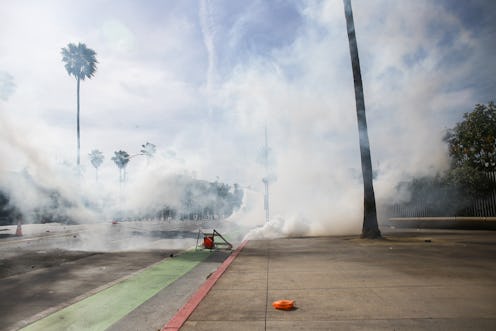
Following the widespread demonstrations that have swept the nation after the police killing of George Floyd, human rights groups have called for banning the use of tear gas. While it’s often called nonlethal, it’s been linked to harmful health effects, from temporary blindness to, as people have claimed on Twitter, spontaneous menstruation.
“We shouldn’t be using tear gas on people of reproductive age,” says Dr. Joia Crear-Perry, an OB-GYN and the president of the National Birth Equity Collaborative. She counsels her patients that protesting can put people who are pregnant or wish to become pregnant at risk of miscarriage, though she acknowledges that protesting racism and violence against Black people will still be a priority for many. “It’s important that we fight [racism]. So how do we stop tear gas from being used on our collective bodies?” she asks.
In a statement, Dr. Gillian Dean, senior director of medical services for Planned Parenthood Federation of America, tells Bustle that there is “currently limited research on the relationship between exposure to tear gas and reproductive health, including spontaneous menstruation, miscarriage, and other complications." Still, it's important to keep in mind that “[t]hough tear gas is considered ‘nonlethal,’ it can still pose a threat to both health and safety.”
Tear gas works by setting off your pain receptors, causing a burning sensation in the eyes, nose, mouth, or lungs. According to the CDC, a number of chemical compounds are used as “riot control agents.” Dean notes that among other harms, tear gas irritates the lungs and can result in respiratory failure — “the same outcome we want to prevent with COVID-19,” she says. Deploying tear gas creates panic among crowds, and the canisters themselves are linked to injuries. “There are reports of permanent blindness and death from tear gas and other ‘riot control’ chemicals, and there could be added risks when victims are elderly, children, or have underlying health conditions.”
Crear-Perry explains that not a lot is known about exactly why tear gas may affect the reproductive system because it’s so obviously harmful that it wouldn’t be ethical to study. “The FDA is not going to approve a research study on tear gas exposure on birthing people because that would require knowingly subjecting birthing people to tear gas,” she says.
Researchers are going to have to wait to see if miscarriage rates increase after this period of intense protesting. Crear-Perry points to data from other countries like Chile where increased miscarriage and fetal malformation rates follow instances of mass tear gas exposure, leading the Chilean government to suspend its use in 2011. According to Scientific American, after tear gas was used during the Arab Spring protests, miscarriage rates went up in affected areas, too.
“When chemicals are used in warfare, birthing outcomes are then always unexpected. When a fetus is growing, all of its organs are developing and any little thing can change the normal course of development,” Crear-Perry adds.
This is just one of the reasons why “using tear gas during protests is a grave concern for human rights,” Dean says. “In the United States, it is an instrument to deter people from exercising their First Amendment right to protest injustices, making it a horrifying affront to democracy. In this moment when there are simultaneous needs to combat two global pandemics — systemic racism and COVID-19 — the use of tear gas is irresponsible and unhelpful to preventing the spread of both.”
Says Crear-Perry, “We continue to push forward speaking out against tear gas at protests because it is emblematic of oppression and ignoring the health of our communities, which is exactly what has led us to protest in the first place.”